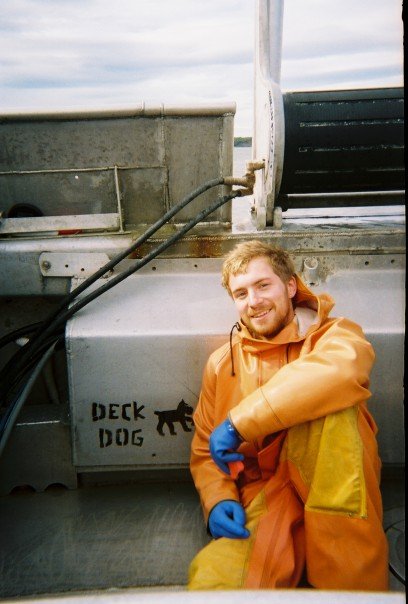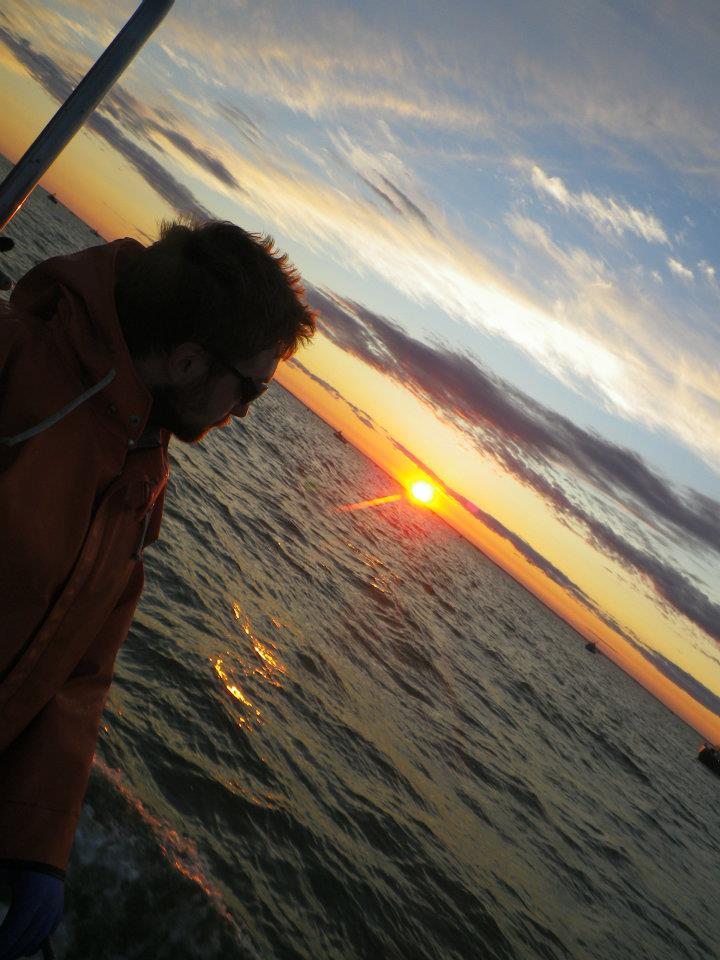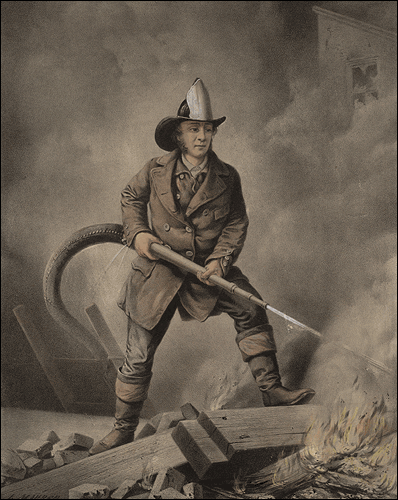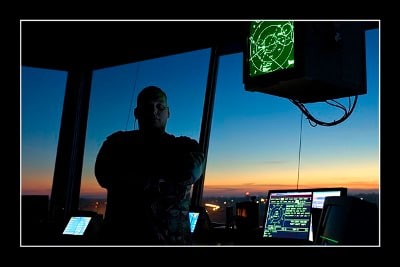
Once again we return to our So You Want My Job series, in which we interview men who are employed in desirable jobs and ask them about the reality of their work and for advice on how men can live their dream.
Have you ever thought about going up to Alaska some summer to work on a boat and try to make a bundle as a commercial fisherman? Graduate student Ivan Kuletz has done it for the last seven seasons and today he gives us a vivid look at what the job is really like. Curious about how much it resembles the show “Deadliest Catch”? Skip down to question #11. And duck.
1. Tell us a little about yourself (Where are you from? How old are you? Describe your job and how long you’ve been at it, etc.).
I was born in south-central Alaska in 1985, and recently I’ve been living in Oregon with my wife for about four years. I have worked as a commercial fishing deckhand in the Bristol Bay Sockeye Salmon fishery (off the coast of Alaska) for seven seasons. Bristol Bay is unique in that it is by far the single largest source of wild-caught salmon in the world, and it is also consistently ranked as one of the best-managed fisheries in the world.
Two things before proceeding: 1) I’ve only worked as a deckhand in this one fishery, so I can only speak authoritatively about that specific experience. 2) I will use masculine pronouns for ease of writing, but understand that there are fisherwomen out on the boats as well and they’re just as capable as any fisherman.
2. Why did you want to become a commercial fisherman?
There’s a dollar bill taped to the inside of a cabinet door in the boat’s cabin. Written on it in Sharpie is the phrase: “This is why we’re here.” If I had a dollar for every time I’ve thought of that dollar, I’d probably have about the same amount of money that I do now.
The other reason is that it’s the job that my father has done for about 25 years. I wanted to see that world and get to know that side of him. When I was a teen, the relationship my father and I had was heading for the rocks, but fishing turned it around for both of us. We gained respect and understanding for each other not just as father and son, but also as hard-working men. From that basis, we rebuilt the other parts of our relationship. I will always be grateful to fishing for that.
3. How do you find a job working in a fishery? Are there classified ads that show openings, or do you really need to just go up there and ask around?
Nearly every crewmember in Bristol Bay got their job because they are related to a captain at least tangentially or are family friends. I am no exception – my father is the skipper of the boat I’ve worked on for the last seven seasons. However, there are many deckhands who found their jobs in other ways. I’ve met skippers who have hired people by putting out Craigslist ads, cannery workers who have literally jumped ship, next-door neighbors who were told to be ready to go to the airport in twenty minutes, and any number of guys wandering the boat yards with nothing but a backpack and a beard, asking if we needed another deckhand. However, the best way to get a job in the fishery is to know somebody who is already in it, preferably a skipper, and to get the job locked in before the season starts.
4. What are captains looking for when they hire someone as a deckhand? Any tips for landing the job?
There are a few main things every skipper looks for in every deckhand, and those are a “fire in the belly,” dependability, the physical and mental ability to do the work, the wherewithal to keep your head on a swivel, and the ability to shift gears dramatically from one second to the next without losing your cool. The icing on the cake, though, is to be mechanically inclined, particularly with diesel engines, hydraulics, electronics, and 12-Volt systems. People with those skills are coveted by skippers and are paid accordingly – as well they should be.
5. What’s the hierarchy of positions on a boat? What does it take to work your way up to becoming a captain?
I can only answer for how things work on my boat, but it’s pretty simple: it’s a democracy of one, and that one is the skipper. The only exception to this, the only time a deckhand is obligated to countermand the skipper, is when it would be physically dangerous to do otherwise.
While nearly every skipper worked as a deckhand for a season or two, there is only one way to become a boat captain, and that’s to buy your own boat and permit, which can be incredibly expensive even with a business loan. But hey, this is from the deckhand’s perspective, right? Some boats have a single deckhand who is essentially in charge of the other deckhands, then a guy or two who knows the work but isn’t in charge, and sometimes a guy or two who’s new – otherwise known as a “greenhorn.” However, while we have different pay grades on our boat, no deckhand’s really in charge, largely because the least experienced guy on our boat now has three years of experience. Also, when you work together long enough, you start to work like a single, multi-bearded organism with gestalt intelligence.
Our boat’s quite different from most boats in one respect: every one of us (including and especially the skipper) puts the needs of the other guys and the group ahead of their personal needs. It works out in a manner very similar to Game Theory, because while we may individually take an occasional loss (sleep, convenience, time, effort, etc.), as a group we all come out ahead of where we’d be with a more selfish focus. It’s important to us because when you live in a cabin the size of most people’s bathroom with three other guys for two months, you had damn well better get along.
6. You do this job seasonally. Can you make enough in a summer to last the rest of the year? If not, what do you and others do during the other months of the year? What is the average pay for a deckhand if you don’t mind sharing?
When I was an undergraduate student, I loved coming back to my rural little college town feeling totally flush with cash. To quote W.C. Fields, “I spent half my money on gambling, alcohol, and wild women. The other half I wasted.” Replace the gambling with “good friends” and that’s about right. Long story short, in the off-season I’ve hustled for other work so that I could avoid showing up to the next season broke or worse. Some guys do manage to make the money last without doing other work, usually by living in places like Mexico or Thailand. There are quite a few teachers and students who come up to fish in the summers because it fits pretty well with their schedules.
“Average” pay is a hard one to nail down. On a fishing boat, deckhands make a percentage of what the boat makes, and it’s up to the skipper to decide how that gets figured out. Some captains pay their crew based on profits after meeting the boat’s overhead, or make their crew pay for airfare, their food, gloves, gear, a percentage of fuel, minus refrigeration bonus; you name it. Our skipper does none of these things. We are paid our percentages from the boat’s gross income with nothing off the top except for penalty tickets from the Troopers for accidentally fishing over the line. Greenhorns on our boat make 6-8%, 9-10% for experienced deckhands, 11-12% for high-value deckhands, and extra for consistently going above-and-beyond. You can see how much of a deckhand’s pay rides on what sort of skipper he has. My advice would be to find a reputable skipper who will discuss all of these things with you and then put down in writing what you’ll be paid and when. I’ve lost track of how many times I’ve heard of shady skippers fleecing their crew on a verbal contract. Last year, we heard about one sad sack who went home with about a hundred dollars. I sure hope somebody picked up his bar tab.
So what do boats make? Well, that’s an even tougher one to reckon. Fishing in Bristol Bay is essentially a form of gambling where you increase your odds of winning by working your ass off. The highest price per pound in the last thirty years was a little over $2/lb., while the lowest was about $0.50/lb. Last season was $1.50/lb. The real problem with that range is that you don’t find out what the price will be until the season is over. Let’s say that a boat catches 150,000 pounds of salmon in a season, and the price for Sockeye that year was $1.30/lb., with an extra $0.10/lb for fish that have been refrigerated (which we do). So on our boat, [150k x 1.4 – Trooper tickets] x [your crew share] = roughly what you get paid for six to eight weeks of work. That math works out to about $20k for a 10% share. On the boat, we refer to the calculator as the “Morale Machine.”

7. What’s an average day like for you?
Short version: Long.
Full experience version :
Imagine that you’ve gotten about four hours of sleep in the last twenty-four. And it wasn’t four hours at once. It was more like two-and-a-half, then awake for seven or eight hours, and then another one-and-a-half. And when I said you’ve gotten four hours of sleep, what I really meant was that you were in your bunk staring at the ceiling that’s less than a foot away or the back of your eyelids, because the boat is anchored in about nine feet of water in a Small Craft Advisory wind (about 30mph) coming from the wrong direction, which means that the waves have stacked up to about five feet. Since you’re in a regulation-length 32-foot-long boat, that means that instead of sleeping you’ve been bracing yourself in your bunk thinking about the dollar taped to the inside of the cabinet and how many days are left in the season and how tired you are and what your sweetheart is doing. You know everybody’s awake, but nobody’s moving or talking because they’re all thinking the same thing, except for the skipper who’s also thinking about how the engine has been sounding weird lately and leaking coolant like a sieve and how old the bilge pumps are. If there’s such a thing as beauty sleep, everybody’s going to leave their bunks a little uglier than when they got in.
The alarm goes off (could be any time of day or night, there’s no such thing as a regular schedule), and you hear the skipper get up and you know that you’ve got another ten minutes of listening to him bitching on the radio with the other skippers in your fishing group. Then the engine fires up and the anchor winch kicks into gear. Now it’s time to commando-crawl out of your bunk, put on the same sweats you’ve been marinating in for at least five days, slap on another coat of deodorant because you haven’t showered in a week, wolf down some food, collect a few bruises and invent some new curses from pinballing around in the cabin, stomp into your Xtratuf boots, jam your heavy-rubber gloves on, clip on your life jacket, and stagger out on deck where you put on cold, clammy, heavy-duty rain gear. It’s about 40 degrees Fahrenheit, but with the wind it feels like 20. It’s probably at least twilight out, since it’s summer in Alaska and that means about twenty hours of daylight. It’s also probably raining sideways.
You can see the fleet waking up around you or already roaring away from the anchorage area to the inside of the district, not wanting to miss a moment of the ten-hour opener that Fish and Game has allotted for drift gillnets in your district. When the boat gets there, the skipper will be jockeying with about four hundred other boats all trying to set their 900-foot-long net in the same spot you are, which means that there can be upwards of 400,000 linear feet of net in the water in a single square mile. To top that off, the State Troopers are zipping around in super-fast skiffs and flying overhead in single-prop planes and dragonfly-like helicopters, trying to catch anyone breaking the law. It gets a little hectic.
But that’s for the skipper to worry about. Your job is to keep your head on a swivel so you and the other guys don’t get hurt, set the net when the skipper says to set it, and carefully watch the net as it pays out at breakneck speed to make sure that it doesn’t catch on something. If it catches on you, you’re going to be set out with the net and everybody’s going to scramble to save you because you can die in minutes in the cold, fast, turbulent water. Usually it’s drowning – sometimes it’s hypothermia. If the net catches on itself or the boat, you need to yell “Backlash!” at the skipper over the roaring engine so he can try to slow the boat down. Meanwhile you slam on the drum brakes and somebody else tries to clear the problem so that you don’t tear your whole net apart. By the way, it’s still Small Craft Advisory, so the deck you’re standing on is pitching from one 45-degree angle to the other 45 every few seconds.
The net’s finally out, and the water around the corks is practically boiling with fish – it’s a great set, but you don’t have time to celebrate. You need to get the hydraulic drum in gear, hop down into the cockpit, and get ready to react in a split second to any number of problems. Only about ten seconds have passed since the net went out, but some other boat is already setting in front of your net like a bat out of hell, and they’ll have about as long as you did before they’re covered up, too. The skipper gives the signal to start bringing the net in, so you start rolling the net up using the hydraulics. The fish come in flopping and jerking, their gills and bodies and tails twisted up in the net. Your job is to get them out in about a second apiece without losing more than a single bar of mesh each. Once you’ve personally picked about 10,000 fish you don’t have to think about how to do it – it’s like riding a cold, slimy, lucrative bicycle. Since your boat isn’t the newest or shiniest, you have to pick the fish up from where they fall and pitch them into the holds about twelve feet away. Did I mention that the boat’s still pitching you from 45 to 45?
You’ve been picking fish for a while when you hear the skipper curse. You look up and realize that with the tide change and the wind shoving you around, you’re being dragged out of district by the fish-heavy net. Even though you’re half a mile away from the line, it’s not looking good. A ticket for being over the line can cost upwards of $3,000. The skipper bellows that it’s time to roundhaul: you’re about to pull the rest of the net in by hand, letting it spill onto the deck, fish and all. It’s the fastest way to get the net in. You and the other deckhands won’t stop until the last of it is on board. You take a firm grip on either the cork line or the lead line, plant your feet, put your hood up, and keep your face pointed at the deck as much as possible – a jellyfish in the eye isn’t a lot of fun.
Then the roundhaul starts. Fish come whipping over the stern roller at head-height, but you focus on putting one hand over the other. The net and the fish are knee-deep, and you take a step back to make room. You’ve only gone a few fathoms, but the boat is already two-tenths of a mile closer to the line. The skipper says, “Faster,” looking everywhere for the Trooper skiff. Your forearms and hands start to burn, but there’s no stopping. One-tenth from the line, now, and there’s still a hundred and fifty feet to go. Everybody’s gasping for breath and forcing leaden arms to keep hauling. At last, the buoy on the end comes over the roller, and you can stop. You would collapse, but you’re up to your waist in fish, so there’s nowhere to flop. Your face burns in a sharp, stabbing way; the jellyfish really had it in for you this time. Your head is covered in blood, scales, and sea salt. Doesn’t matter, though, because you just made $500.
The skipper checks the GPS: 30 feet inside the line. No ticket today. He whoops and tells the crew that he’s going to motor in-district by a few miles, and he wants to set the net when the boat gets there because there’s still five hours left in the opener, unless Fish and Game does an emergency opener extension. After the re-set, somebody can make some hot food for everyone. But that’s later. Right now you’ve got two hours to pick all the fish out of the tangled pile of net and get it ready to set again, and you’re going to need every minute. You and the other deckhands stretch, crack stiff joints and bad jokes, and get to work. The wind and the rain have died down a little bit, and if it was getting dark when you woke up a few hours ago, dawn is creeping into the steely gray sky. Just another day at the office.
8. What is the best part of your job?
The stories I hear. The stories I live. The camaraderie. Seeing the same ugly mugs every summer. The pride I get from doing hard physical work well. The way the job forces me to live in the moment. The raw beauty of it all. And the paycheck.
9. What is the worst part of your job?
Leaving my wife for two months. Not being able to fall asleep. Testing the limits of the human olfactory system. Alright, I should probably stop.
10. What is the work/family/life balance like for you?
My job takes me away from my wife for two straight months. When I started, the only way to reliably contact people in the outside world was by letter, which could take weeks. For the last few years, we’ve had steadily improving satellite phone service, enough so that for the last two seasons I’ve made good on my ambitious promise to call my wife every day. Not easy when you can’t keep track of what day it is. It’s usually about a minute-long phone call at some bizarre hour of the day, with me yelling over the static and rumbling engine that I’m okay and my wife saying that everything is okay at home before we lose signal. Sometimes, though, I get lucky and get a good signal when we’re not fishing and the engine is off. Then we can talk for a little while – it’s well worth giving up sleep to hear her voice.
11. What is the biggest misconception people have about your job?
“Wow, is that like Deadliest Catch?”
I swear, the next guy who says that is going to get a fish in the face. No, it’s not like Discovery Channel’s show “Deadliest Catch.” Here’s the thing about shows like that: good fishing practices don’t necessarily make for good TV. We were actually approached by the History Channel hoping to do a Deadliest Catch spinoff show, but we turned them down because our boat isn’t big enough to accommodate even one spare person. We heard from some guys that did let them on their boat for the season that they were constantly asking them to do incredibly stupid or dangerous things “for the shot.” They also wrote scripts for the skipper and deckhands to make it look like they were fighting or in dire straits. In short, reality TV is a bunch of malarkey that can get you killed. The other problem with shows like that is that real life will always trump fiction for pure chaos, strangeness, excitement, hilarity, bravery, and awe. But you’ll never capture it without actually being there and taking the journey.
12. Any other advice, tips, commentary or anecdotes you’d like to share?
Protecting the resource is the focus for every true fisherman, second only to the safety of the boat and the crew. To that end, Bristol Bay fishermen have almost unanimously lined up to oppose the Pebble Mine proposal that would put one of the world’s largest pit mines at one of the headwaters for the Bristol Bay region. Since I’m going back to school to get my master’s in wild fisheries policy, my days as an active fisherman are numbered. I’m glad that I got a chance to write this article before I’m done. I offer my sincere thanks to Brett and Kate McKay for that opportunity. I’ll leave you with one of my favorite poems.
Tags: So You Want My JobBoats in a Fog
By Robinson JeffersSports and gallantries, the stage, the arts, the antics of dancers,
The exuberant voices of music,
Have charm for children but lack nobility; it is bitter earnestness
That makes beauty; the mind
Knows, grown adult.
A sudden fog-drift muffled the ocean,
A throbbing of engines moved in it,
At length, a stone’s throw out, between the rocks and the vapor,
One by one moved shadows
Out of the mystery, shadows, fishing-boats, trailing each other
Following the cliff for guidance,
Holding a difficult path between the peril of the sea-fog
And the foam on the shore granite.
One by one, trailing their leader, six crept by me,
Out of the vapor and into it,
The throb of their engines subdued by the fog, patient and cautious,
Coasting all round the peninsula
Back to the buoys in Monterey harbor. A flight of pelicans
Is nothing lovelier to look at;
The flight of the planets is nothing nobler; all the arts lose virtue
Against the essential reality
Of creatures going about their business among the equally
Earnest elements of nature.







